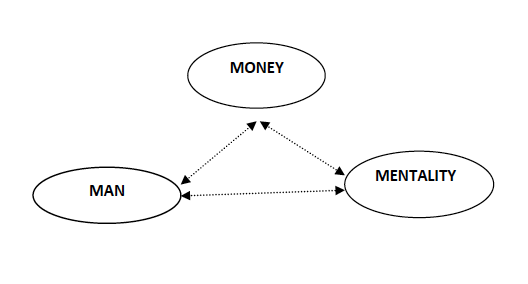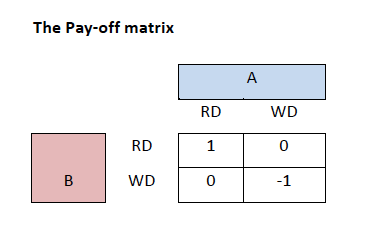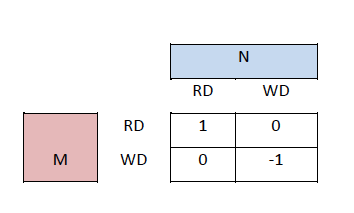When it is a question of money, no one wants to compromise, at least after the Wall Street cracked last year, and everybody seem to have joined the same religion – Moneyism to fight against the demon christened recession. Surprisingly money seems to have been the only prophet which has unified people without a crusade. Who knows, if man can understand the art of handling money, men with the right mentality probably that can be one of the steps forward to envisage a peaceful world.
‘If a man (ager) can understand the art of handling his men, their mentality and the money, probably that is all it takes to envisage a successful project’.
Since the time of blue green algae every living form has evolved only because they received a positive reward. A simple paradigm is migration of organisms from the depth of oceans into land. The primary reason for this shift would have undoubtedly been a positive reward-i.e. food. Soon after the organisms came to land, a number of newer organisms evolved and they began to thrive together. This success within the ever extending stick of evolution was exponentially achieved by sharing and at the same time, there must have been a primary factor that every single organism would have loved to do or have. If food had been that primary factor then, undoubtedly its money now.
If we undermine the basis of evolution, it runs in great synchrony with some fantastic neologic thinking – game theory, prisoner’s dilemma. Whenever a reward was shared and seeked with a healthy motto (explicitly or in disguise) the stick of evolution kept and will keep extending.
Is there any other form of organism that outsmarts us? Possible? At least in future? Or never?
If you had answered no, not possible or never, at least once, then can you feel the jolt that the stick of evolution has stopped growing! Is there a way we can help it be continuous?
Let us retrospect, the process of evolution was always continuous when the organisms were functioning together and a primary factor kept them threaded. Is this not similar to the projects that we do, where we all function together to succeed? But how does the success comes? What do we term as success? Or owe the success?
Is it the money that gets churned in because of the project? Or Men who work for the project? Or the attitude the men had through the life of the project?

Isn’t this an intricate phenomenon? It is almost impossible to separate one from the other and attribute success. If you observe the above diagram can you visualize the three eggs: Money, Man and Mentality and a hidden triangle within which a manager works? The only objective that the manager has is, ’not to break the eggs’. The only way to ensure that the eggs are not broken is by taking the right decisions.
Egg 1-Money: Step one has always been to foresee the profit and then take decisions that lead to the profit. In line with the famous quote,’ fortune favors the brave’; ‘fortune also comes to the bravely taken right decisions’. The first line of success to a project is commented by saying ‘it is a profitable deal’. It is also essential to understand how profitable it is? Programme how the profit can be a profit for the men who work with the profit to bring in more profit.
Egg 2- Man: It becomes essential to understand that to triumph one need to do what is best for himself and to the team. However, to understand and make a decision and individual is influenced from outside and from within. Some of the key factors that can influence the person before taking a decision include: personal interest, experience, family, peer, time of the day, current life situation.
Egg 3- Mentality: Success often can be cherished only when there is an absolute mentality that seeks it. It is always categorical and can never be discrete. Some factors that can drive the mentality: Name and fame earned because of the work done for the company and the individual, personal urge to help arrive at a common consensus to succeed, despite disagreements, however with a motive of gains either achieved in the past or expected in future, dynamic influence of thought by another person whom the individual considers can take a better decision, free will, pre-set mind, gut feeling, altruism (!).
The Triangle and the eggs: It becomes essential for any manager to work within the triangle to ensure that there always exists equilibrium and that no egg is incubated too much. This now demands on understanding how the equilibrium evolves denovo and needs to be nurtured to maintain homeostasis.
Nash equilibrium, as a tool to understand on how to work within the triangle
Nash equilibrium is a solution concept of a game that involves two or more player, in which each player is assumed to know the equilibrium strategies of the other players, and no player has anything to gain by changing only his or her strategy unilaterally. If each player has chosen a strategy and no player can benefit by changing his or her strategy while the other players keep their strategies unchanged , then the current set of strategy choices and the corresponding pay-offs constitute a Nash equilibrium. In reality egg 2 contains men and egg 3 contains the mentality of the men within egg 2. If the game is to succeed, then success gets measured on the pay-offs earned by the company and the individuals who work for it. However, in this game, we can have ’n’ individuals who will have ‘n’ ideas continually. It becomes the role of the manager to ensure that the pay offs are not disturbed by the choices made by any individual within egg2 influenced by factors within egg 3.
Hence the manager needs to understand the strategies(S) of the ‘n’ players and the desired pay off (f) and thread the eggs together. It is also necessary for the manager to make men within egg 3 to understand the strategies (X) that are assumed to give the desired pay off (P) for the project.
 A (host) and B (client) are two companies, where RD (right decision) made by both the companies earns them a payoff of (1, 1) while a wrong decision made by both the companies earns a payoff of (-1,-1). However, the matrix also reveals that when one company takes the right decision and the other doesn’t then the payoff is (0, 1) or (1, 0). From history it is evident that the later can never result in a sustainable collaboration, while the chances of establishing a long term sustainable collaboration is high when the payoff is (1,1) where there is a mutual agreement to do business. Let us now apply the same pay offs between men in egg 2.
A (host) and B (client) are two companies, where RD (right decision) made by both the companies earns them a payoff of (1, 1) while a wrong decision made by both the companies earns a payoff of (-1,-1). However, the matrix also reveals that when one company takes the right decision and the other doesn’t then the payoff is (0, 1) or (1, 0). From history it is evident that the later can never result in a sustainable collaboration, while the chances of establishing a long term sustainable collaboration is high when the payoff is (1,1) where there is a mutual agreement to do business. Let us now apply the same pay offs between men in egg 2.
 Let M and N be two men within egg 2 working for company A. Assuming whenever they make a choice that is in line with the agreements that led to a pay-off of (1,1) for A, they in turn receive a payoff of (1,1) by their manager. Whenever their choices are mutually exclusive within themselves or with the agreements signed by company A, then their payoff is (-1,-1). However, when the choice made by any one of the individual is in line with the agreements made by company A, while the choice made by the other is a deviant then the pay offs are either (0,1) or (1,0).
Let M and N be two men within egg 2 working for company A. Assuming whenever they make a choice that is in line with the agreements that led to a pay-off of (1,1) for A, they in turn receive a payoff of (1,1) by their manager. Whenever their choices are mutually exclusive within themselves or with the agreements signed by company A, then their payoff is (-1,-1). However, when the choice made by any one of the individual is in line with the agreements made by company A, while the choice made by the other is a deviant then the pay offs are either (0,1) or (1,0).
It is essential for the manager to analyze the choices made by men within egg 2 with greater care when the payoffs are in the line (-1,-1) as this reflects a mutual agreement within egg 2 that is mutually exclusive with the agreement that led to a payoff of (1, 1) for the company A. Attention needs to be given to individuals whenever, the payoffs are in the line of (0,1) or (1,0) and take appropriate action plan to ensure that the system remains in Nash equilibrium.
A well directed chaos is essential
Before any system attains a state of equilibrium there will be a chaos. A chaos continues when one system gets attracted to another randomly. The attraction occurs because of a high pay off. However, the system is deemed chaotic, since it lacks direction. It is imperative that the manager understands and directs the chaos towards a state of equilibrium, which can still yield the payoff. The chaos within egg 1, 2 and 3 need to be directed towards equilibrium
Neuro-Psychology of the manager while working within the triangle:
A manager generally uses and takes the help of his working memory, long term memory, working memory, mirror neurons, free will and gut feelings while making choices to direct chaos towards equilibrium and maintain equilibrium.
However, it is also essential all these are also used by men within egg 2. An in-depth understanding of these will increase the efficiency of work within the triangle.
Egg needs to hatch
Though it is essential for the manager to work within the triangle and ensure that the egg does not break, it is important that manager nurtures and ensure that the egg hatches. That alone can lead to evolution of newer projects and roles.
After all everything needs to evolve in this universe!!

Written by: Arun Chokkappa







